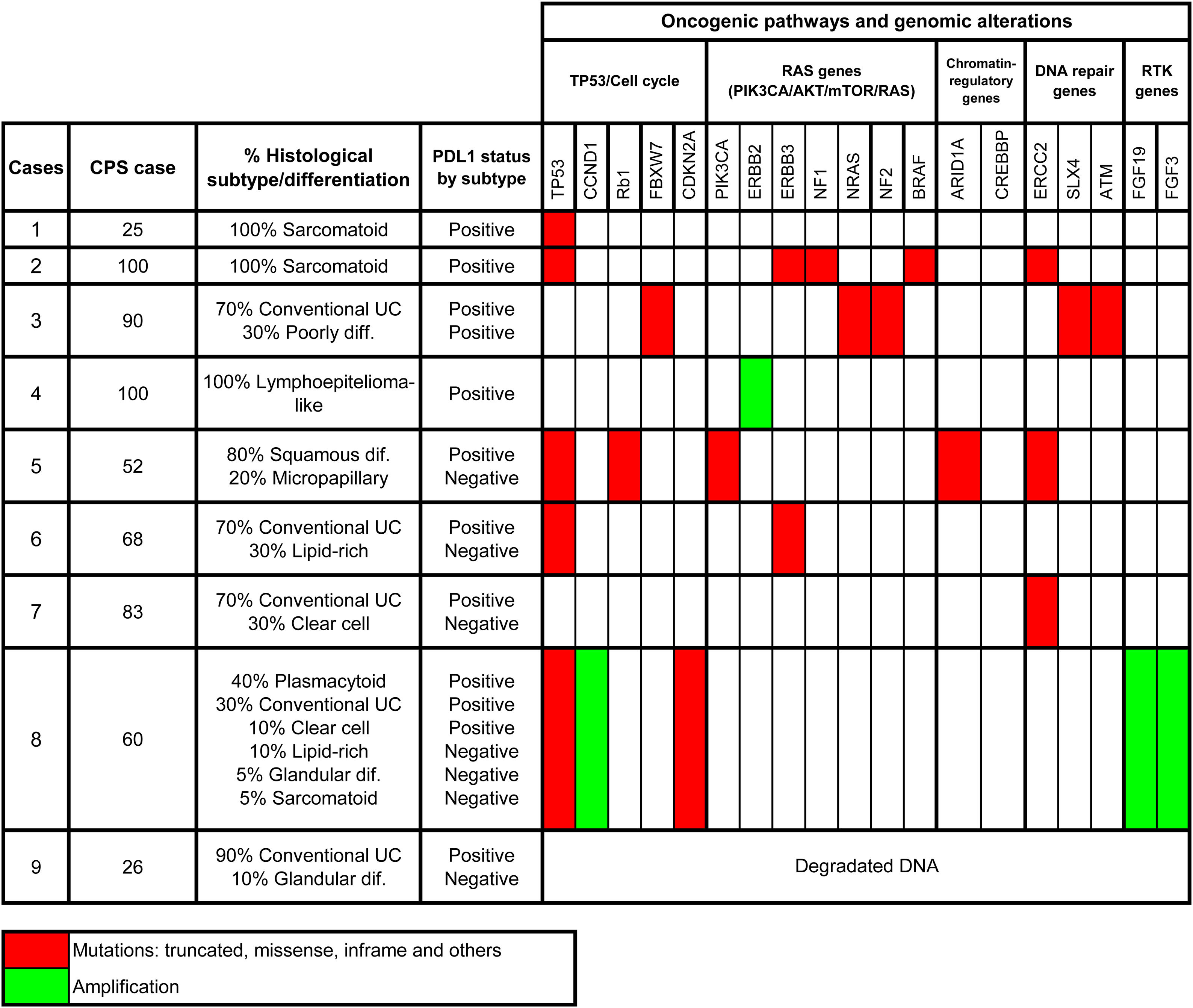Urothelial carcinoma (UC) has histological subtypes whose phenotype reflects their molecular diversity, behavior and response to conventional therapy. Immune checkpoint inhibitors (ICIs) have improved the management of UC by evaluation of PD-L1. In the case of PD-L1 22C3, the initiation of ICI is considered from a combined positive score (CPS) greater than 10. However, UC subtypes with absent PD-L1 22C3 expression in cases with CPS>10 may not respond to these treatments. This study aims to establish a correlation between the PD-L1 immunoexpression and molecular alterations in divergent differentiation and histological subtypes of UC (UC-s).
Material and methodsTwenty-six samples of UC were detected from a total of 24 patients. Two pathologists performed separately an assessment of UC-s on hematoxylin–eosin as well as PD-L1 expression. Molecular study of each case was performed by next generation sequencing (NGS). A descriptive analysis of the variables included was conducted.
ResultsNine cases (34.61%) showed a CPS>10, some with negative PD-L1 immunoexpression in aggressive UC-s. The molecular study revealed alterations in genes belonging to the p53/cell cycle control, RAS, and DNA repair pathways, among others. None of the alterations were exclusive to any histological subtype.
DiscussionSpecial attention should be paid to CPS>10 cases that include histological subtypes of UC with divergent expression for PD-L1 as they may not respond to treatment with ICI. We recommend examining the proportion and PD-L1 status of each subtype, especially if it has aggressive behavior.
El carcinoma urotelial (CU) presenta subtipos histológicos cuyo fenotipo refleja su diversidad molecular, su comportamiento y su respuesta al tratamiento. Los inhibidores de puntos de control inmunitario (ICI) han mejorado el manejo del CU mediante la evaluación de PD-L1. En el caso de PD-L1 22C3, se considera el inicio de ICI a partir de una puntuación positiva combinada (combined positive score [CPS]) mayor de 10. Sin embargo, los subtipos de CU con ausencia de expresión de PD-L1 22C3 en casos con CPS>10 podrían no responder a estos tratamientos. Este estudio pretende establecer una correlación entre la inmunoexpresión de PD-L1 y las alteraciones moleculares en áreas con diferenciación divergente y subtipos histológicos de CU (CU-s).
Material y métodosSe obtuvieron 26 muestras con CU de 24 pacientes. Dos patólogos evaluaron de manera independiente las CU-s en hematoxilina-eosina y la expresión de PD-L1. Se realizó el estudio molecular mediante Next Generation Sequencing (NGS). Se realizó un análisis descriptivo de las variables incluidas.
ResultadosNueve casos (34,61%) mostraron un CPS>10, algunos con PD-L1 negativo en los CU-s de comportamiento agresivo. El estudio molecular reveló alteraciones en genes de las vías de p53/control del ciclo celular, RAS y reparación del ADN, entre otras. Ninguna alteración fue exclusiva de algún CU-s.
DiscusiónDebe prestarse especial atención a los casos con CPS>10 que incluyan subtipos histológicos con expresión divergente para PD-L1, ya que podrían no responder al tratamiento con ICI. Se recomienda cuantificar la proporción y el estado de PD-L1 de cada subtipo, especialmente si es de comportamiento agresivo.












